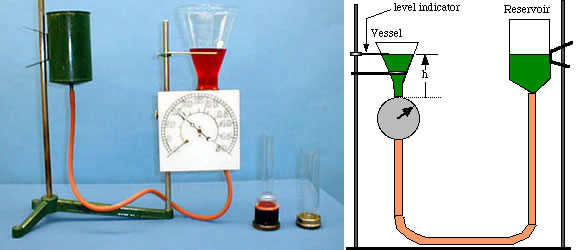Demos: 2B-02 Pascal's Vases

A large container of water (reservoir) can be moved vertically on its stand. Various shaped vessels, all having a common base area, are attached to a gauge that shows the liquid pressure at the vessel’s base. In each case the pressure is dependent only on the height h and not the volume or shape of the vessel. With one vessel in place, one can also show the dependence of the pressure on h.
Directions: DO EVERYTHING SLOWLY!! At the start the level of water in the reservoir will be below the level of the base. Screw one of the vessels into the base, making sure it is tight. Set the indicator to the height you want the water to be. VERY SLOWLY raise the reservoir to bring the water level up. (A screen in the base prevents the water from coming through too quickly. Consequently, the reservoir level will be higher than the vessel level at first.) Make fine adjustments as the water level nears the indicated level. Tap the scale to make sure it is reading correctly. Lower the reservoir, and when the water has drained out of the vessel, replace it with one of a different shape. Repeat the process. (Note that the scale is actually reading a force, but since the base area is the same for all vessels, the pressure is the same if the force is the same.)
Suggestions for Presentation: Hold up the three vessels and ask the students if these vessels were filled to the same height, how would the pressure differ, if any, at the base. You might lead them on by suggesting that these vessels, if filled to the same height, would have significantly different weights of water in them.
Applications: Pressures at the base, say, of a variety of storage tanks, all having greatly different volumes, will be same if the height of the liquid is the same. A mercury column in a barometer will stand to the same height, regardless of the diameter of the tube.
Last Updated: Nov 30, 2023 11:25 AM